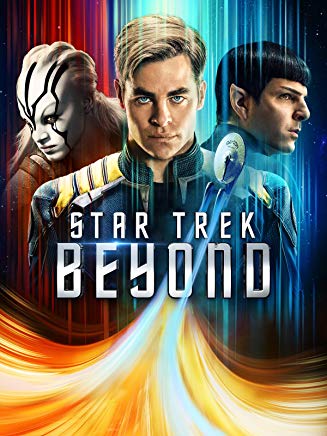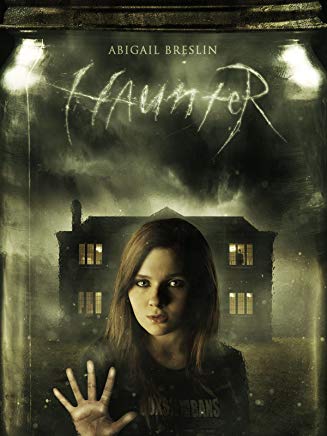 Star Trek Beyond (2016) – I sort of enjoyed the first reboot Star Trek movie, as long as I remembered that the character which was labeled “James Kirk” was entirely unrelated to the Jim Kirk I had grown up with. And I never bothered to see Into Darkness — I had no desire to support the franchise in becoming a series of remakes of the classic films, and the utterly idiotic “It’s the return of an iconic Trek villain but we’re going to pretend that you don’t immediately guess that it’s Khan because FOOLED YOU!!!” pre-marketing campaign turned me right off.
Star Trek Beyond (2016) – I sort of enjoyed the first reboot Star Trek movie, as long as I remembered that the character which was labeled “James Kirk” was entirely unrelated to the Jim Kirk I had grown up with. And I never bothered to see Into Darkness — I had no desire to support the franchise in becoming a series of remakes of the classic films, and the utterly idiotic “It’s the return of an iconic Trek villain but we’re going to pretend that you don’t immediately guess that it’s Khan because FOOLED YOU!!!” pre-marketing campaign turned me right off.
Beyond had its good points:
- Kirk’s awareness of mortality which, because it was prompted by being a year older than his father had been at death, did NOT seem like a rehash of Shatner-Kirk’s character arc in The Wrath of Khan
- Spock’s soul-searching caused by Ambassador Spock’s death (a nice nod to Leonard Nimoy’s passing)
- trapping Spock and McCoy together just so they can bicker like old times
..and its bad points:
- Scotty never rose above the level of “comic relief”
- the antagonist’s motivations seemed arbitrary
- the “ultimate weapon” was a lot slower than simply using a nuke
- Scotty can take an old starship lying where it crash-landed decades ago and get it running in an afternoon? Whatevs…
- “Hey, let’s destroy the Enterprise! We haven’t already seen THAT in multiple movies!”
- The Enterprise has individual escape pods, enough for every single member of the crew?
- If YOU were going to build a huge, fragile and hard-to-defend Starbase, would YOU locate it twenty minutes from an impenetrable nebula whose contents you know nothing about?
- Yes, let’s find a reason to blast rock music during the battle climax just to prove that this isn’t your dad’s Star Trek…
What I really appreciated, though, was the sense of closure to this movie, bringing the reboot arc to a natural close. Together with Spock going through Ambassador Spock’s effects and finding a treasured photograph of the classic crew (sometime during the movie era, aged several decades beyond the characters in the reboot movies), it was an acknowledgment that the Star Trek franchise was bigger than just this reboot series, and really depended on that special magic brought by the original characters played by the original actors. All else is tribute.
 Haunter (2016) – The best haunted house stories are mystery stories as well, and this movie knows it. Teenager Lisa (Abigail Breslin, a tremendous child actor now growing up and growing well) keeps experiencing the same day over and over — the day before her sixteenth birthday — and her parents and little brother don’t seem to realize it. But then things start to change in the routine of the day… and the thick fog around the house doesn’t let her leave… and and strange noises and glimpses lead her to believe that there’s more than just the four of them in the house.
Haunter (2016) – The best haunted house stories are mystery stories as well, and this movie knows it. Teenager Lisa (Abigail Breslin, a tremendous child actor now growing up and growing well) keeps experiencing the same day over and over — the day before her sixteenth birthday — and her parents and little brother don’t seem to realize it. But then things start to change in the routine of the day… and the thick fog around the house doesn’t let her leave… and and strange noises and glimpses lead her to believe that there’s more than just the four of them in the house.
I recommended this movie to my novelist friend Michaelbrent Collings as being right up his alley — in fact, I had to do some detective work on IMDb that he hadn’t actually written it under a pseudonym. But I can’t tell you which two of his novels I was reminded of specifically, because that would constitute spoilers.
(And I had already recognized two actors as Canadians from their appearances in Canadian-lensed movies and TV shows — Highlander: The Series, etc. — so it wasn’t a shock when I saw an Ontario license plate front-and-center late in the movie.)
 The Ten Commandments (2006) – No Charlton Heston, no Yul Brynner; this is an ABC TV miniseries version, clocking in at 167 minutes. The production values are adequate for the venue and era, but the script is sort of chunky; the entire first half seems rushed. And every version of the Exodus story, it seems, from the 1956 version (I will admit to not having seen DeMille’s silent 1923 version yet)to 1998’s Prince of Egypt, to 2014’s Exodus: Gods and Kings, feels it incumbent to frame the story in terms of fraternal conflict, and this version is no exception. Moses’s adopted brother here is NOT the Pharaoh, however; instead, he’s the commander of the military, and he and Aaron each seem jealous of the other’s brotherly status.
The Ten Commandments (2006) – No Charlton Heston, no Yul Brynner; this is an ABC TV miniseries version, clocking in at 167 minutes. The production values are adequate for the venue and era, but the script is sort of chunky; the entire first half seems rushed. And every version of the Exodus story, it seems, from the 1956 version (I will admit to not having seen DeMille’s silent 1923 version yet)to 1998’s Prince of Egypt, to 2014’s Exodus: Gods and Kings, feels it incumbent to frame the story in terms of fraternal conflict, and this version is no exception. Moses’s adopted brother here is NOT the Pharaoh, however; instead, he’s the commander of the military, and he and Aaron each seem jealous of the other’s brotherly status.
With the crossing of the Red Sea coming at the break between the two parts, most of the “good” stuff happens in the first half; not unlike the deMille version, the bestowal of the titular ten commandments seems like an afterthought to the main story (definitely something that The Prince of Egypt got right). Moses here is beset by doubts, as in PoE (and as indicated in the original biblical account, as well), but this Moses never seems to find peace with his role as the spokesman for a God whose edicts he doesn’t always agree with. The character arc never fully arcs.
In a world in which both the excellent Charlton Heston version and the excellent animated version exist, this iteration is no more necessary than the Christian Bale version.
Abandoned movies: Star Pilot (1966)